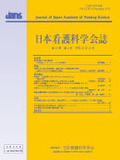Japanese
English
- 販売していません
- Abstract 文献概要
- 参考文献 Reference
要旨
目的:植込み型除細動器(ICD)を移植した患者にとって,その後の生活に見通しが立たないことは生活上の困難事のひとつとされているが,実際にどのような生活を送っているかについては不明な点が多い.本研究の目的は,壮年期患者の退院後の生活において,その行動や認識が持つ意味に着目し,ICDとともに生きるプロセスを明らかにすることである.
方法:研究協力者8名に対して半構造化面接を行い,得られた逐語録を修正版グラウンデッド・セオリー・アプローチによって分析した.
結果:18の概念で構成される6つのカテゴリー〈関係性構築の必要性に気づく〉,〈他者と再び関係性をつくる〉,〈ICDに対する見方を変える〉,〈自分流のガイドラインづくり〉,〈ICDが日常化する〉,〈改めて気を引き締める〉と,1つのコアカテゴリー【自分と他者および自分とICDとの関係性の構築】が抽出された.
結論:患者は他者やICDとの関係性を構築・再構築する過程を通して,ICDと生活をともにしていくことが明らかになった.
Purpose: Uncertain prospects of life with Implantable Cardioverter Defibrillators (ICD) are one of the major concerns in life among patients, but this has not been examined in Japan. This study aimed to identify cognitive and behavioral processes of how middle-aged patients receiving ICD manage to cope.
Methods: Semi-structured interviews were conducted involving 8 subjects (6 males and 2 females), and the obtained verbatim transcriptions were analyzed using a modified grounded theory approach.
Results: A total of 18 concepts were generated, and they were classified into 6 categories: 〈become aware of the necessity of forging relationships〉, 〈forge trusting relationships with others〉, 〈try to view constraints from different perspectives〉, 〈create personalized guidelines〉, 〈become used to the use of ICD〉, and 〈brace oneself again〉 and 1 core category: [forging relationships with others and ICD].
Conclusion: The results suggest that middle-aged Japanese patients receiving ICD follow the process of forging and reforging relationships with others and ICD in order to manage their lives.
Copyright © 2014, Japan Academy of Nursing Science. All rights reserved.


